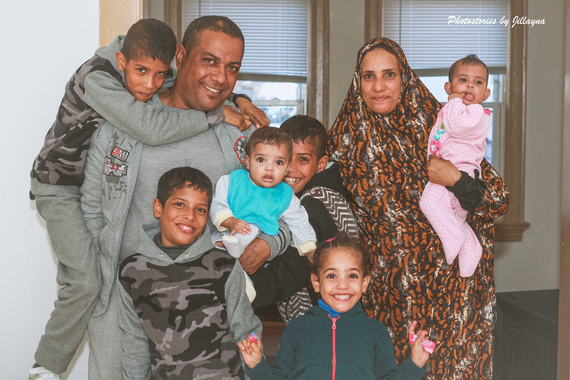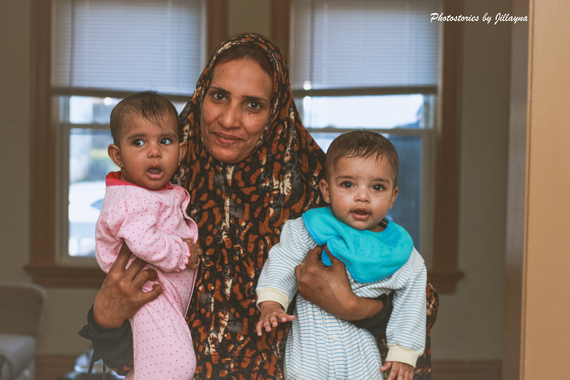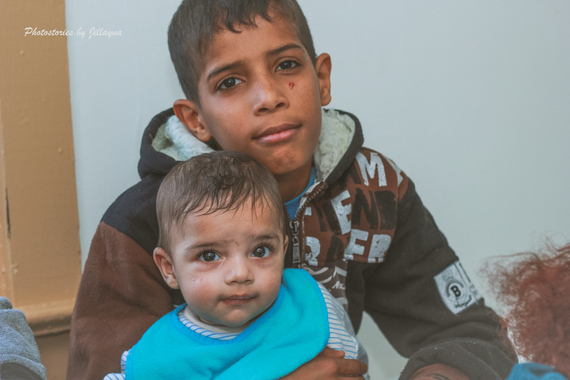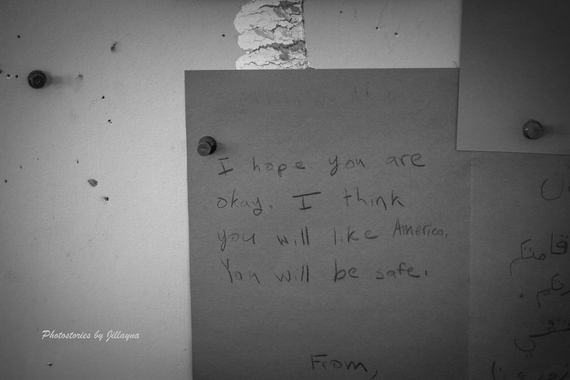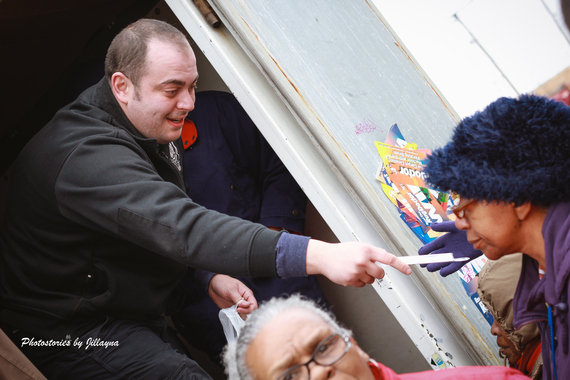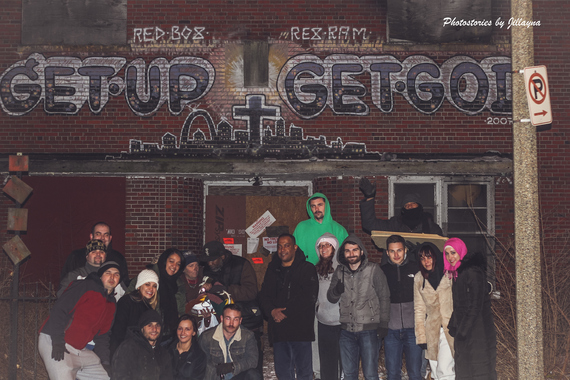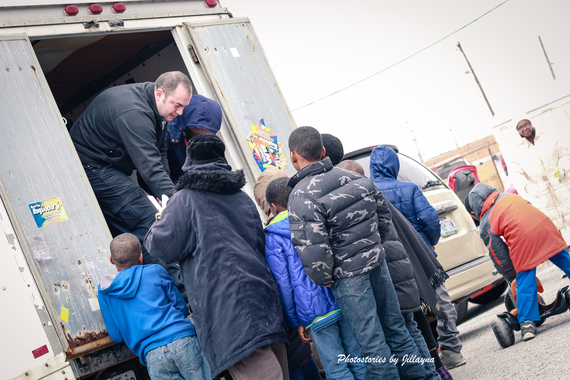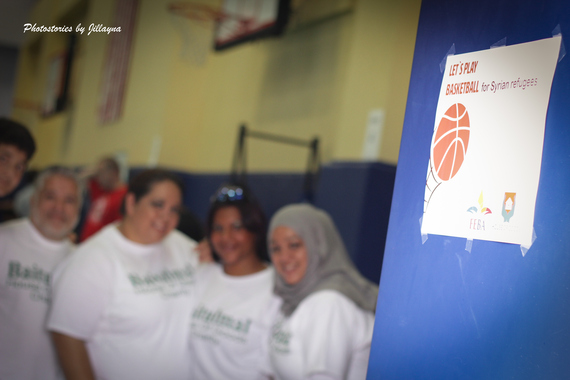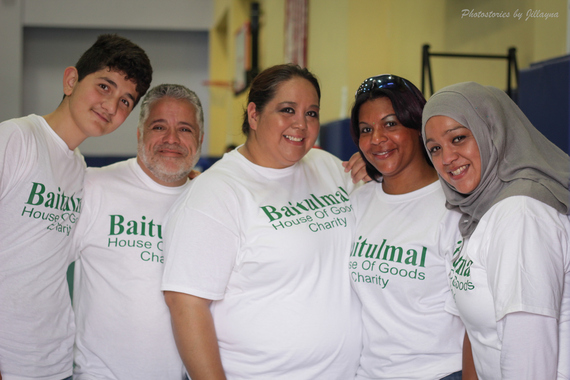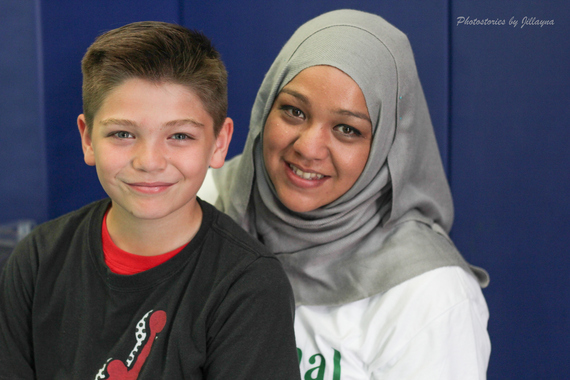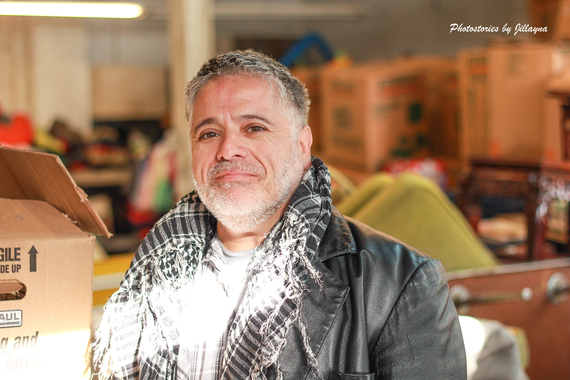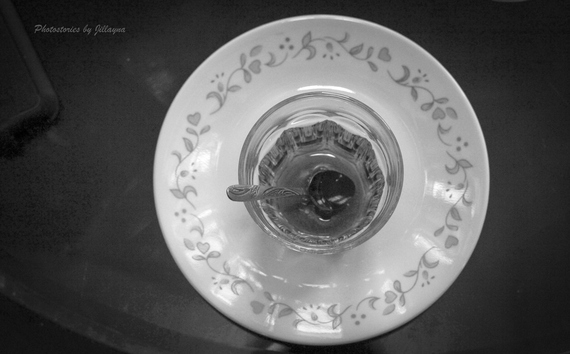The first thing she tells me, when I ask what they need, is "nothing." She knows this English word well and shakes her head, with a small smile. He chimes in, watching her as he speaks, "we all have each other."
They have been in St. Louis only a few weeks when I first meet them, and their journey from Iraq has been five years in the making. Six children, ranging from six months to 11 years. The kids are playful and jovial, quick to sit in, to try and join discussion. They care for their infant siblings naturally and without being asked. They say 'please' and 'thank you' in tiny accents. They know how to say that they are 'good'. And if you ask them how they are, that is what they will tell you. Mostly, they are quiet, until prompted to play, or talk, or be silly. And once they realize it's okay, they are great at being silly.
Things are moving somewhat swiftly for this family. They have finally received their cards for health coverage, food assistance, and the children have gotten their shots; the oldest three are now able to register for school.
Within their first few months, Dad managed to secure a job, and had already begun eagerly learning English. People have made donations, and with help of volunteers (many of which are refugees themselves) the family was able to get clothing for the ebb and flow of unpredictable St. Louis weather, beds, a television, cookware. After years on the move, they were finally able to settle into some kind of unfamiliar stability.
And now they are here, dropped into the middle of the United States. Scrambling to learn a language, adapt to a culture, survive, find and secure any work they can. Days trapped in a home whose rent they only have assistance for for three months, in a city where they came knowing no one. No car or license to drive anywhere, unfamiliar foods and unfamiliar customs. The family spends most of their time in the home. The boys, always smiling, are full of energy -- quick to entertain themselves -- to play soccer in the backyard or build a tower out of blocks. Their 4 year old daughter is eager to play too, to join in, though typically finds herself back at the side of her mother or father. They tell me that she is a daddy's girl.
I can only imagine the stir crazy feeling of being trapped in a home for days on end. At first, a cold winter outside. Few visitors (though increasing), and very few with whom you can communicate. Mom spends many days in tears, in a homesickness most of us couldn't begin to imagine.
Like many, this family had been threatened with death. With his wife pregnant at the time and four children, this father took his family and fled to Jordan, awaiting refuge in the United States. It would be a long journey. But his affiliation in working with an Americans in Iraq had left him vulnerable, and it wasn't a chance he was willing to take.
A year after making it to Jordan, they found themselves in St. Louis. Not long before, mom had given birth to twins, suffered a stroke, and one of their eldest sons had had to have heart surgery.
The family had fled their home, their culture and their family in boundless fear, gone on to endure unending hardship, isolation, medical emergencies. They had arrived in a new country with little more than hope and a few packed bags. And here they are now, sitting on a donated sofa in a place they are working to call home, drinking tea, smiles on their faces, quite sure of their blessings. Quite sure that really, what they need is nothing.
* * * *
In small pockets and makeshift food drives, donation warehouses, and small-scale fundraising and rallies, St. Louis is making strides in becoming a welcoming community to immigrants and refugees from around the world. That is, many St. Louis residents are volunteering, one person at a time, and driving and creating this change. A small developing organization known as House of Goods, also known as Baitulmal, is one such force. Baitulmal was started through the Islamic Foundation of St. Louis and Adil Imdad, a county police chaplain. Their work began with the intentions of assisting any and all in-need St. Louis communities during the Ferguson unrest in 2014. It has since continued its support, which now includes new refugee families. The small organization has been propelled by Dzemal Bijedic, a refugee himself, whose family came to St. Louis during the unrest in Bosnia in 1997 when he was a young teenager. Bijedic is familiar with the plight of the slow struggle of resettlement in a new country. Now, nearly twenty years later, he is St. Louis' first Muslim police chaplain, and leading others in helping St. Louis to support not only the refugee population, but all those in need.
In fact, many of these helpers are refugees and immigrants who are reaching out with open arms to any individuals who are struggling--despite the discrimination and backlash they may face living their daily lives as a refugee in America. Those contributing come from a variety of backgrounds. Some have busy lives and day jobs, or very little themselves, others are new refugees still learning the language. As Bijedic notes, it's simply about people helping others. House of Goods does everything from taking and delivering furniture donations, to collecting housewares and basic foods and helping new families to settle into a different world. They also make regular night trips to feed St. Louis' homeless communities. They bring water, sandwiches and fruit, jackets and blankets. More recently, they held a fundraiser basketball game, in which a number of participants signed up to play three-on-three. As one volunteer put it, "humanity is what we are here for--we're here for each other." Bijedic relays often, "no one gets left behind".
And the need to serve is trickling down. Lisa Grozdanic's (also a propeller of House of Goods), son, Aallen helped to spearhead a hygiene donation drive at his elementary school, raising over 1500 products for those in need. And he was only in grade 4.
The slogan that has been coined in support of incoming families seeking refuge in the United States is simple: Bring them Here. For those fleeing their countries in search of peace and safety, you are welcome here. Even in the grassroots, communities in St. Louis have been putting these very words into action. Various supporting rallies, food and donation drives have been organized, and nonprofits have been active. The diverse communities of St. Louis, some of them those who once immigrated to the city themselves, are working together to create a united community of welcoming. In the midst of unending political debates and mindless tragedies cloaked in hate and racism, prejudices and sexism, there are those, in the thick of it all, pushing for good. To care, to help, to welcome, has nothing to do with one's religion, race, ethnicity, citizenship. To be human is not binding on these things.
And while the city has a ways to go in supporting our incoming families, St. Louisans are showing that they care. And you can be a part of the change, a part of welcoming. Even in the small scale. You can say hello.
* * * *
When I first meet with new refugee families, the silence doesn't matter. There is this frequent misconception, this oversight that tends to plague people. They ask, isn't it awkward? If they don't know the language? If they are still learning English? If you can barely talk in words at first?
It's a funny question to me, mostly because of its irrelevancy. Many of these families are away from all of their family, friends, community--the whole world they have known forever. Many are from countries who approach community and a village mentality in an entirely different way that may be unfamiliar to Americans. In their home countries, or in the process of resettling travel (such as refugee camps), many of these families are surrounded. There are always people around who understand them and go through the same struggle. There is always noise and company and the familiarity of at least a little bit of social chaos.
And now, they are here. And they are alone. Alone in the homes or apartments they are set up with. Alone with an unfamiliar silence, one they can't even easily escape because of language and transportation and general cultural barriers. Alone in a country that they know is not all welcoming of them.
So, awkward? That is beside the point. I try to explain this to people. To support refugees in our cities and country is not just to tolerate, donate few dollars or shrug your shoulders. Bring them Here is a stance of open-armed welcoming. Don't avoid newcomers. Don't look away because you are unsure if they understand the language. Welcome them. Feel a little bit awkward. Sit with them, drink their tea. Sit in silence, or amongst the chatter of an unfamiliar language. Play marbles and cards with their children. Stop by. Visit. Invite them out. They are trying to learn English. To learn about a culture, learn the words of a new language. They are seeking familiar faces. Others, support, comfort. Welcome them.
It is so simple. So vital. And yet people often don't think about it. They avoid. They think it the role of someone else; something that, surely someone else is doing. Except this is a welcoming on all of us. The role of each of us as a part of our communities, is to welcome and to care, in however small a way you are able. It can be as simple as a smile or hello. It all matters.
* * * *
Amani* has been in St. Louis for two months and 11 days when I meet with her. She tells me she is a new grandmother, and a mother of eight. Coming from Syria, Amani and her family spent 4 years in refugee camps in Turkey.
She knows the days, she tells me, because their days of financial support for rent (from the International Institute) are drawing to a close. "20 days left", she tells me. There is worry etched into her eyebrows, creases at the corners of her eyes. Her worries aren't only limited to the huge plight of a refugee family's relocation--but also the health of her family.
She shows me a picture of her only daughter, aged 9. Her smile is wide and infectious. She sits in a wheelchair with pink balloons--a donation from a family through House of Goods. Her daughter, born with Spina Bifida and paralyzed from the waist down, requires immense extra care. Mom describes multiple mental handicaps. Nine days ago, a shunt was placed in her brain. She also struggles with kidney failure.
She tells me about her husband's medical struggles. He is totally dependent on his wife and children, his kidney now functioning at 25%, his vision gone, his strength dried. I try to imagine how mom has managed thus far. Eight children, one with serious illness, her husband in a stage of life-threatening kidney failure.
And so, she tells me. She tells me about seeing their town in Syria reduced to piles of rubble, her then-2 year old's screams and cries each time an airplane flew overhead. She tells me about her children dropping to the ground at any loud and sudden sound. 4 years in the camps in Turkey. 10 to a tent.
She puts her hands up to her throat--thyroids- she says. She is tired. Very tired. There are tears in her eyes. They are eyes that hold a thousand stories I can't even fathom.
I watch this woman, this mother and wife who has undoubtedly been the backbone and strength of her family for countless years and through countless hardships. She has carried this family. She has been the rock, the glue. And I see it in her now.
And, it's personal. I feel the stories I hear in my bones--knotting in my stomach and burning in my throat. I feel them in some way forever after. We sit together as humans, and it is simple. As simple as it should be for all Americans.
I am welcome anytime. Many families tell me this again and again. Upon seeing me, they brew tea and set out biscuits and cookies. We sit in their living rooms sipping hot tea or coffee with sugar in refreshingly small mugs. Children and family members huddle in, and with smiles and eagerness, they welcome me.
To learn more about House of Goods or volunteer your time, visit their Facebook page.
Support the Bring Them Here movement and learn more on their Facebook Page.
Join CAIR-Missouri and Bring Them Here in St. Louis on Aug. 28 at 6 p.m. to rally and remind the world's refugees that they are still welcome here!
Follow the author's work here.
*Disclaimer: The author also works as a therapist, specifically working with refugee families. The author separately writes various awareness pieces which are in no way attached to her work as a therapist or the organization by which she is employed. In her work for this awareness piece, none of the author's clients were interviewed or referenced. All families speaking with the author did so of their own volition for the purpose of the written piece. For the sake of privacy, names have been changed and/or omitted.
